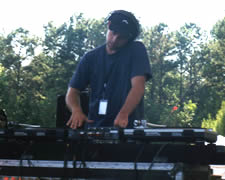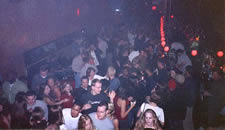The Astronomical Rise of Techno & House
Dan Kurzius' Sidereal time
By Carter Tracy
[Creative Loafing Atlanta]
Electronic dance music can be confusing to the neophyte. The categories and subcategories seem to be proliferating overnight: house, trance, industrial, progressive trance, jungle, ambient, Eurodance, illbient, -- the list goes on. But scratch the surface and you'll find that dance music has a history and an established foundation out of which today's music evolved.
Techno, one of the earlier forms of electronic dance music and one of the most influential, originated in Detroit in the mid-'80s when a small group of friends started experimenting with simple synthesizers and Roland drum machines. The genre is defined by its sped-up 4/4 pattern averaging 128 beats per minute and its technical sounding, futuristic melodies. Aside from Detroit and its neighboring cities, techno has since taken off all over Europe, where it is practically considered mainstream music. Techno festivals like Love Parade in Berlin attract more than a million people. In Atlanta, where electronic dance music as a whole is still considered very "underground," techno is most often overlooked in favor of more current trends of dance music like breaks and drum & bass.
However, techno does have its presence here. Sidereal Records, run by Dan Kurzius, known to some as dK, is a small all-techno record label that's been around for two and a half years and has successfully released six 12-inch EPs, with the seventh due out this fall. The music has a classic Detroit influence with its own unique flair, and the records have sold mainly overseas in countries such as Germany and Japan, where the market for techno is much larger. But with its increasing popularity around the US, Kurzius finds he's getting more and more attention stateside.

Dan Kurzius, known to some as dK |
Kurzius' involvement in electronic music started as early as 1987 in Dallas where he and a group of friends started listening to new bands like Skinny Puppy, Shamen, Nitzer Ebb, Baby Ford -- as well as Kraftwerk -- whose music incorporated synthesizers and drum machines more so than guitars. Kurzius admits he wasn't very fond of what he was hearing at first, and says he "found it to be repetitive and even a little irritating."
"But after listening to it for a while I started to notice the melodies and understand the thought behind the programming and composition," he recalls.
He started buying the latest electronic records every week and quickly found his niche in the dance music coming out of Chicago and Detroit, known as house and techno, respectively. "At the time, because of the limit of the equipment being used," Kurzius recalls, "the only difference between the two was tempo, techno being faster; and the fact that house music tended to have vocal samples while techno, which was more technical in sound, did not. Still, you could very easily interchange the two."
In the early '90s in Texas, Kurzius and his friends felt isolated in their love of electronic dance music. They started a fanzine, Hard Sync, to get some exposure to the music they loved.
"We wanted to connect with others who were into the music, too," Kurzius says. "We thought a fanzine would be a good way to educate the people around here about techno and house, as well as to meet people up in Detroit and Chicago where the scene was really going on."
Hard Sync consisted mainly of record reviews and interviews with producers, differentiating it from more established dance music magazines that tended to focus on clubs and fashion. Hard Sync found its way oversees with the help of some supportive dance music distributors in Detroit and was rated No. 2 in a list of the best U.S. dance music fanzines by House Attack, a popular German music magazine. The exposure Kurzius got through the magazine helped establish him as an influential figure in the American techno scene, as well as introducing him to key contacts around the world.
By 1993, Kurzius started buying equipment and learning how to produce techno music on his own, which in turn led to the idea of starting a record label as an outlet to release his music. Soon after relocating to Atlanta in 1995, Kurzius founded Sidereal Records. An astronomical measurement of time defined as four minutes shorter than the solar day, the word "sidereal" reflects Kurzius' personal interest in astronomy but also pays tribute to the original innovators of techno -- Juan Atkins, Derrick May, Kevin Saunderson, among others -- who were said to have been greatly inspired by astronomy and science fiction. Sidereal's first release was a 12-inch ep called 23h 56m of Solar Time, recorded under Kurzius' alias, DJ Pawn. The record was immediately picked up by distributors and shipped to Japan where it sold quite well, giving him the incentive to continue releasing his tracks.
The second release, the Gibberish EP, was more problematic. "I was still developing my production techniques and I wasn't happy with the way the record was mastered," Kurzius recalls. But another German magazine out of Frankfurt called Front Page praised a heavy bass track on the B-side and again it sold well. Other releases include records produced by friends D-Ram, a duo from Houston, and 8088, a producer from Chicago.

Late Night party @ Trinity Atlanta |
Kurzius has since branched out stylistically. Collaborating with California house producer, Chris Penny (aka CPEN), he released Late Night Essentials Volume 1, an EP of down-tempo house tracks, which sold more than 50 copies in one Atlanta record shop alone. A "breakaway release" that initiated a subsidiary house music label, Late Night Essentials... was the first record to catch the eye of Atlanta's dance music scene.
"The record really seemed to fit into the style of music that has been very popular out here." Kurzius explains. "Most party-goers as well as DJs seem to like a nice balance of melody and funk and that's exactly what we worked towards when putting the tracks together. Overall, it was just a good crossover project. Since I mainly release techno tracks, most of that material goes directly overseas as the techno scene is still developing in America. Of course that applies to Atlanta."
But with Sidereal's seventh release due out at the end of September, people are beginning to take notice. The Tracer, a four-song, 12-inch EP, features another local techno producer and music innovator Matt Kew. In addition to that release, Kurzius is assembling the Sidereal Records vs. Late Night Essentials compilation for CD as well as vinyl. It will consist of both Detroit-style techno and down-tempo house and will feature local producers Amdek (another of Kurzius's aliases), Bobble (junglist turned house producer), Matt Kew and an undergraduate from Georgia Tech named Zachary Smith, as well as internationally known producers John Tejada, Convextion, 8088 and Stuart Walker.
Asked how he expects the compilation to be received locally, Kurzius observes: "It seems to me that within the past year the interest in techno in Atlanta has started to gain momentum. Going through the shops [Satellite & Rewind] I've noticed more kids requesting good underground techno records. It seems there is a new group of dance-music followers that has an interest in digging a bit deeper."
|

